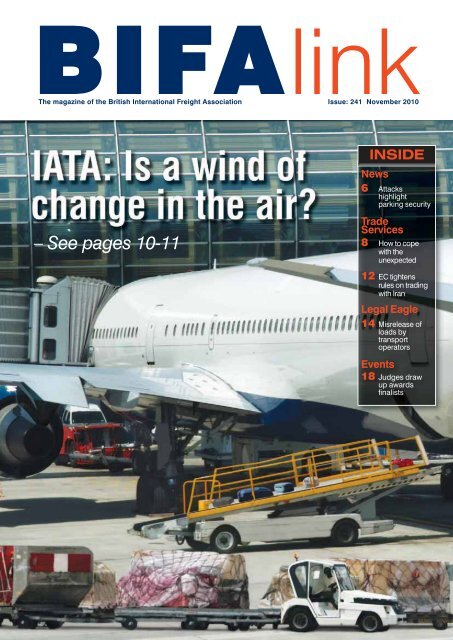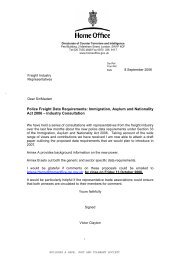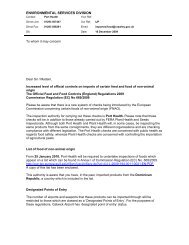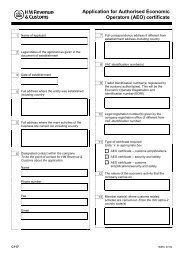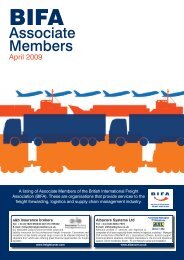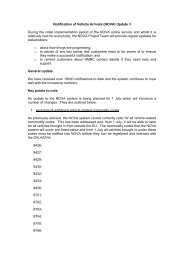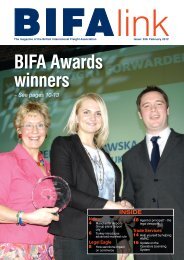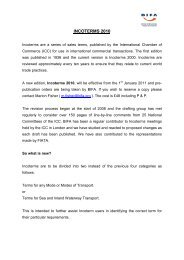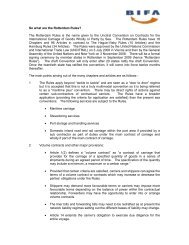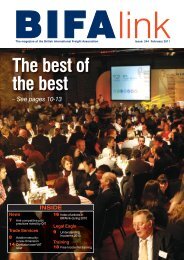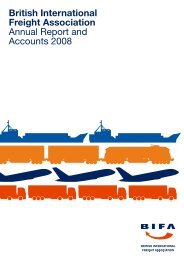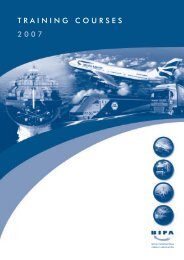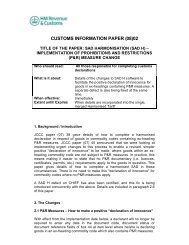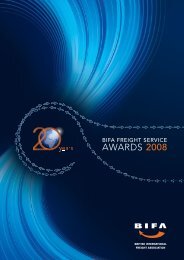BIFAlink cover - British International Freight Association
BIFAlink cover - British International Freight Association
BIFAlink cover - British International Freight Association
- No tags were found...
Create successful ePaper yourself
Turn your PDF publications into a flip-book with our unique Google optimized e-Paper software.
<strong>BIFAlink</strong><br />
The magazine of the <strong>British</strong> <strong>International</strong> <strong>Freight</strong> <strong>Association</strong> Issue: 241 November 2010<br />
– See pages 10-11<br />
INSIDE<br />
News<br />
6 Attacks<br />
highlight<br />
parking security<br />
Trade<br />
Services<br />
8 How to cope<br />
with the<br />
unexpected<br />
12 EC tightens<br />
rules on trading<br />
with Iran<br />
Legal Eagle<br />
14 Misrelease of<br />
loads by<br />
transport<br />
operators<br />
Events<br />
18 Judges draw<br />
up awards<br />
finalists
PETER QUANTRILL’S COLUMN<br />
DIRECTOR<br />
GENERAL<br />
<strong>BIFAlink</strong> is the official magazine of the<br />
<strong>British</strong> <strong>International</strong> <strong>Freight</strong> <strong>Association</strong><br />
Redfern House, Browells Lane, Feltham<br />
TW13 7EP Tel: 020 8844 2266<br />
Fax: 020 8890 5546<br />
Web site: www.bifa.org<br />
E-mail: bifa@bifa.org<br />
A company limited by guarantee.<br />
Registered in England: 391973.<br />
VAT Registration: 216476363<br />
Director General<br />
Peter Quantrill<br />
p.quantrill@bifa.org<br />
Executive Director<br />
Robert Keen<br />
r.keen@bifa.org<br />
Director Trade Services<br />
John O’Connell<br />
j.oconnell@bifa.org<br />
Manager Trade Services<br />
Robert Windsor<br />
r.windsor@bifa.org<br />
Member Relationship & Information Manager<br />
Spencer Stevenson<br />
s.stevenson@bifa.org<br />
Editorial Co-ordinator<br />
Sharon Hammond<br />
s.hammond@bifa.org<br />
Administration Controller<br />
Jane Robinson<br />
j.robinson@bifa.org<br />
Published by<br />
Park Lane Publishing<br />
peter@parklanepublishingltd.com<br />
Contributors<br />
Peter Quantrill, Robert Keen, John<br />
O’Connell, Robert Windsor, Spencer<br />
Stevenson, Sharon Hammond<br />
Regional Representatives<br />
Alph Forrest - alphf@btinternet.com<br />
Scotland<br />
Paul Young<br />
youngyes@aol.com<br />
North West, Midlands & Northern Ireland<br />
Geoff Stark<br />
grstark@grstark.karoo.co.uk<br />
North East (Humber, West Yorkshire)<br />
Colin Young<br />
young_colin@talk21.com<br />
South (London West, Solent, SW England &<br />
S Wales)<br />
Nigel Peall – nigel.peall@btinternet.com<br />
South East (London East, Dover, Felixstowe,<br />
Rochester)<br />
Subscription rates: UK £36<br />
Rest of the World £48<br />
Please be advised that BIFA DOES NOT<br />
OFFER LEGAL ADVICE. BIFA is not a law firm<br />
and the authors of this publication are not<br />
legally qualified and do not have any legal<br />
training. The guidance and assistance set out<br />
herein are based on BIFA’s own experience<br />
with the issues concerned and should not be<br />
in any circumstances regarded or relied upon<br />
as legal advice. It is strongly recommended<br />
that anyone considering further action based<br />
on the information contained in this publication<br />
should seek the advice of a qualified<br />
professional. The authors will not accept liability<br />
for any losses suffered as the result of<br />
having acted on the guidance and assistance<br />
provided if such professional advice has not<br />
been sought.<br />
Preparing for the new ICS<br />
It is November and thoughts begin to turn to the challenges we will face in the new year. One<br />
challenge on which BIFA has been very active on behalf of our members over the last few<br />
months has been the implementation (on New Year’s Day) of the new Import Control System<br />
(ICS), the security amendment to the European Community (EC) Customs Code.<br />
As I write this column, we have just concluded a series of seminars run to help members<br />
become better acquainted with how the rules are changing, and what they must do when the ICS<br />
is live. Around 500 attendees have been present at the seminars all over the country seeing our<br />
Trade Services group in places as far afield as Dover and Belfast. All have come away with a<br />
greater understanding of the changes and what they will require from Britain’s freight forwarding<br />
community.<br />
I am very pleased with the positive response the seminars generated. I am especially pleased<br />
that a number of forwarders requested in-house seminars which we were able to deliver.<br />
Whilst it remains to be seen how ICS will operate in practice, freight forwarders must still<br />
consider the possible impact of this new regime on their business activities. It must not be<br />
forgotten that ICS is a separate process from handling the import customs declaration submitted<br />
to CHIEF.<br />
News and events<br />
Much information about ICS has been included in <strong>BIFAlink</strong> and, as ever, I invite you to take<br />
some time to read the contents of this issue to keep abreast of <strong>Association</strong> and strategic industry<br />
news and events that can so easily impact on your business, both positively and negatively.<br />
In this issue, on page 6, we look at why one of the most frequent complaints among the UK<br />
road sector is the lack of secure truck parking both here and abroad.<br />
If you are involved in transporting cargo to and from Iran, our article on page 12 about new<br />
European Commission restrictions on traffic with that nation is a must-read for your business.<br />
This issue also includes timely advice (on page 14) from the TT Club on the release of cargo<br />
without presentation of the transport operator bill of lading. This is a growing issue and can often<br />
lead to a claim against the member, yet can so easily be avoided. In a similar vein, an article on<br />
page 8 delivers practical advice on how risk can be taken out of the global supply chain.<br />
We also take another timely look at IATA’s Cargo Agents Settlement System (CASS).<br />
Compliance in the UK remains at or around 98%. Remarkably, this impressive statistic has been<br />
maintained despite the global financial crisis that forwarders and their customers have had to<br />
endure over recent times. However, our story contains a salutary warning about the system that<br />
could have repercussions for any BIFA member.<br />
Looking past the approaching festive season, it gives me great pleasure to invite you to visit<br />
www.bifa.org to view the list of finalists for the BIFA <strong>Freight</strong> Service Awards 2010 competition.<br />
Make sure you add a date in your diary to attend the luncheon on 20 January 2011, where the<br />
awards will be presented and where rivals in business can come together for a few hours to make<br />
new contacts and new friends.<br />
Let us hope that by then the new ICS is running smoothly and causing no problems for BIFA<br />
members. ■<br />
November 2010 3
newsdesk<br />
www.bifa.org<br />
Ian Matheson, from Impress Communications, reviews some recent news that might impact on members’ business<br />
SNCF puts Channel operator<br />
SeaFrance up for sale<br />
French national rail operator<br />
SNCF has sought bids for its<br />
subsidiary SeaFrance,<br />
confirming media reports. The<br />
potential buyer will enjoy the<br />
position of “a leading operator<br />
for cross-Channel traffic” said<br />
the railway.<br />
The Rail <strong>Freight</strong> Group has<br />
published a new paper setting<br />
out its views on how the<br />
railways can best achieve cost<br />
reduction, economic growth<br />
and carbon reduction, without<br />
the need to adopt ideas such<br />
as vertical integration. It<br />
outlines some of the successes<br />
of the rail freight market and, in<br />
particular, how it has achieved<br />
a 30% improvement in<br />
efficiencies since being<br />
privatised.<br />
A launch event for ProtectRail,<br />
a €21 million European<br />
Commission-funded<br />
programme that aims to<br />
develop an integrated system<br />
intended to improve European<br />
railway security through better<br />
protection of trains and<br />
railways, was hosted by the<br />
<strong>International</strong> Union of Railways<br />
(UIC) last month.<br />
A report commissioned by the<br />
Campaign for Better Transport<br />
shows that Britain is lagging<br />
behind other European<br />
countries in developing a<br />
charging system for lorries to<br />
end unfair competition from<br />
foreign hauliers.<br />
TRANS European <strong>Freight</strong><br />
Exchange, an internet platform<br />
where users share information<br />
about available loads and<br />
vehicles, has developed a<br />
highly efficient solution for<br />
marketing freight loads and<br />
truck space. The innovation is<br />
specially tailored to the<br />
requirements of forwarding<br />
alliances and larger forwarders<br />
with numerous branch offices.<br />
UK business secretary Vince<br />
Cable has visited DP World’s<br />
London Gateway project to<br />
give his backing to the<br />
£1.5 billion River Thames port<br />
and logistics park project. A<br />
potential of 36,000 new jobs<br />
could be created in the<br />
Thurrock, Essex, area.<br />
The port of Felixstowe<br />
handled a record 10,764<br />
containers (16,209 teu) by rail<br />
in the week ending 26<br />
September, beating the<br />
previous record by 182 boxes.<br />
Felixstowe said the increased<br />
volumes follow a number of<br />
track and equipment<br />
improvements made over the<br />
past two years, including a<br />
39 metre extension of the<br />
South Rail Terminal to<br />
accommodate 22-wagon trains,<br />
and the inauguration of a<br />
second new rail-mounted<br />
gantry crane in August.<br />
Research by industry<br />
consultant Box Trade<br />
Intelligence (BTI) shows that<br />
shipping lines’ Asia-European<br />
services generated a<br />
$5.3 billion profit during the<br />
first half of 2010, compared<br />
with losses of $3.3 billion in the<br />
same period last year.<br />
This winter will see a growing<br />
number of idle containerships<br />
as lines layupvesselsfor the<br />
season, said Paris-based<br />
analyst AXS Alphaliner. The<br />
majority of ships expected to<br />
be laid-up are over 3,000 teu, a<br />
size of vessel difficult to switch<br />
to alternative trades.<br />
The Federal Aviation<br />
Administration in Washington<br />
has issued a safety alert for<br />
operators summarising<br />
research on the risks<br />
associated with the<br />
transporting of lithium batteries<br />
as cargo on aircraft. It<br />
recommends actions that air<br />
carriers and forwarders can<br />
take to reduce those risks.<br />
The restocking phase of the<br />
inventory cycle helped push<br />
international cargo traffic up<br />
19.6% in August, compared<br />
with 23% growth in July. Official<br />
figures show this was 3%<br />
above the pre-recession<br />
levels of early 2008. During the<br />
firstquarter,airfreightgrewat<br />
an annualised rate of 25%, but<br />
only 12% for the first two<br />
months of the third quarter.<br />
Air Cargo News reported last<br />
month that despite meeting<br />
the deadline for 100% cargo<br />
screening, the US<br />
Transportation Security<br />
Administration still has gaping<br />
holes in its security,<br />
according to inspectors. The<br />
inspector general at the<br />
Department of Homeland<br />
Security investigated the<br />
current screening process and<br />
reported that terrorists can still<br />
easily smuggle explosives into<br />
the cargo of passenger<br />
aircraft.<br />
Cargo traffic at London<br />
Heathrow grew 12.2% in<br />
September over the same<br />
month a year ago, but freight<br />
demand showed signs of<br />
slipping with the airport’s<br />
smallest monthly tonnage since<br />
April. Heathrow’s cargo<br />
tonnage fell 2.7% in September<br />
compared with August, the<br />
second straight month-tomonth<br />
decline, airport manager<br />
BAA reported. ■<br />
4 November 2010
Fromdesktoptodestination<br />
<br />
<br />
<br />
<br />
<br />
<br />
Glyn Smith, Operations Director – Mapcargo <strong>International</strong><br />
<strong>International</strong> freight forwarding & global logistics<br />
<br />
<br />
www.boxtop.net/study
newsdesk<br />
www.bifa.org<br />
Incoterms 2010<br />
pre-orders<br />
A new edition of Incoterms will<br />
be published later this year,<br />
with effect from 1 January<br />
2011. BIFA will as usual be<br />
carrying a stock, and if you<br />
would like to reserve a copy<br />
please let us know now.<br />
Regularly incorporated into<br />
sales contracts worldwide,<br />
Incoterms define, in a set of<br />
three-letter trade terms, the<br />
risks and responsibilities of all<br />
parties in an international<br />
sales contract. Used by large<br />
and small businesses alike,<br />
Incoterms are applied to the<br />
sales of billions of dollars of<br />
goods each year and provide<br />
businesses with the confidence<br />
and certainty to operate<br />
in unfamiliar markets and<br />
legal jurisdictions.<br />
The Incoterms 2010 rules<br />
incorporate changes to keep<br />
pace with international trade<br />
developments. With revised<br />
definitions and interpretation of<br />
rules to provide greater clarity<br />
and precision, Incoterms 2010<br />
include:<br />
● Extensive guidance notes<br />
explaining the fundamentals<br />
of each Incoterms rule,<br />
such as when it should be<br />
used; when risk passes;<br />
and how costs are allocated<br />
between buyer and seller;<br />
● New classifications to help<br />
choose the most suitable<br />
rule in relation to the mode<br />
of transport;<br />
● Advice for the use of electronic<br />
procedures;<br />
● Provisions for the allocation<br />
of obligations related to<br />
security-related clearances<br />
for shipments;<br />
● Updated provisions in relation<br />
to insurance, taking into<br />
account the revision of the<br />
Institute of Cargo Clauses;<br />
● Enhanced usability for<br />
domestic trade.<br />
The price of the new<br />
publication is £48.00 (inc<br />
p&p). To reserve a copy,<br />
contact Marion Fisher at<br />
BIFA by e-mail at<br />
m.fisher@bifa.org<br />
Attacks highlight<br />
parking security<br />
One of the most frequent<br />
complaints from the road<br />
sector is the lack of secure<br />
parking for trucks in both the<br />
UK and the EU.<br />
Where they can, BIFA’s<br />
regional representatives<br />
become involved in local police<br />
initiatives to reduce vehicle<br />
crime. But that is the problem –<br />
these initiatives are at a local<br />
level and fail to tackle a national<br />
problem, despite funding from<br />
our government and/or the<br />
European Commission (EC).<br />
Recently funding has been<br />
cut and some of these<br />
programmes cancelled.<br />
Domestically, the hotspots<br />
for vehicle-related crime are the<br />
northwest, the motorway<br />
network around Birmingham,<br />
and lastly Essex.<br />
The EC has been investigating<br />
solutions, and a labelling<br />
scheme of up to five stars has<br />
been suggested to indicate the<br />
standards at a truck stop.<br />
The EC has included both<br />
security and comfort standards<br />
within its scheme, which has<br />
complicated the issue.<br />
Also there is the question of<br />
liability. Consignors may try to<br />
insist on truckers using stops of<br />
only a certain star rating.<br />
Should no space be available<br />
at one of these and goods were<br />
How to check a<br />
BIFA member<br />
You can check whether a<br />
company is a bona fide<br />
member of BIFA by going<br />
to www.bifa.org and<br />
selecting ‘find a forwarder’.<br />
Alternatively, contact the<br />
membership department<br />
via j.robinson@bifa.org ■<br />
stolen from the truck, where<br />
would the liability rest<br />
The alternative system,<br />
supported by the Road<br />
Haulage <strong>Association</strong> (RHA), is<br />
establishing minimum security<br />
standards such as adequate<br />
lighting and CCTV. A description<br />
of the available facilities<br />
would be provided and the<br />
trucker would then conduct his<br />
own risk assessment.<br />
As the industry rightly points<br />
out, the initial problem is not<br />
standards but one of capacity –<br />
spacemustbeprovidedbefore<br />
addressing the standards<br />
issues.<br />
The EC is debating the<br />
subject this autumn and we<br />
would like to pass any<br />
members’ comments to the EC<br />
via our membership of CLECAT.<br />
● The <strong>Association</strong> of European<br />
Vehicle Logistics (ECG) has<br />
recently advised of a series of<br />
incidents in several countries<br />
Your subscription<br />
that might be connected.<br />
According to ECG, since the<br />
beginning of June there have<br />
been at least four night-time<br />
attacks on transporters parked<br />
up in motorway service areas in<br />
northeast France, four in<br />
Belgium in different areas, and<br />
two in the Netherlands.<br />
In all cases it was the vehicles<br />
on the back that were first<br />
setonfire,notthetrucksthemselves.<br />
The affected loads have<br />
been from a wide range of<br />
brands and the transport<br />
companies also have been<br />
from a number of different<br />
countries. ■<br />
If any member has any<br />
comments to make on this<br />
matter please e-mail them to<br />
Robert Windsor at<br />
r.windsor@bifa.org<br />
We would like to thank the RHA<br />
for their assistance in preparing<br />
this information.<br />
It is that time of year again! Trade subscriptions for 2011 will be<br />
dispatched during December. As these invoices relate to the year<br />
beginning 1 January 2011, they will be VAT-rated at the new rate<br />
of 20%.<br />
The subscription rate itself remains unchanged for a further<br />
year. We would appreciate payment as soon as possible after<br />
1 January 2011 when a receipted VAT invoice will be issued.<br />
Remember that prompt payment keeps administration charges<br />
down, and this is to the benefit of every member. ■<br />
Please contact Jane Robinson at the Secretariat if you have<br />
any questions via j.robinson@bifa.org 020 8844 3639<br />
6 November 2010
www.bifa.org<br />
newsdesk<br />
Contact details and helplines for<br />
HMRC/DEFRA/FERA and UKBA<br />
The ACAE (a committee jointly funded by<br />
BIFA and ASM) has compiled a list of<br />
useful information for those of you who<br />
need to make contact with some of the<br />
UK’s authorities in trade facilitation.<br />
HMRC <strong>International</strong><br />
Trade/CITEX/Cross-Cutting<br />
Group, Cardiff<br />
Tel 02920 325546<br />
Fax 02920 326544<br />
Activities include:<br />
● NES helpdesk.<br />
● Calls relating to problems with getting<br />
entries onto the CHIEF system and<br />
general export queries.<br />
● EORI team which issues EORI numbers<br />
to the trade.<br />
● Export Unit of Expertise which deals<br />
with export queries and with reauthorisation<br />
of Export Simplified Procedures.<br />
HMRC National Advice Service,<br />
Cardiff<br />
Tel 0845 010 9000<br />
Activities include;<br />
● Advice on VAT, excise and international<br />
trade matters including:<br />
● Assistance in the interpretation of a<br />
public notice or customs regime.<br />
● General advice.<br />
● Assistance with the completion of<br />
customs forms.<br />
● Advice on duty rates for any commodity<br />
code the caller has (NB only three in<br />
any one call).<br />
● Logging of missing responses from<br />
CHIEF and forwarded to HMRC TSK.<br />
HMRC National Clearance Hub, Salford<br />
DEFRAFERA 24 x 7 helplines<br />
Tel 0844 248 0071 FERA (import team)<br />
Tel 08459 335577 DEFRA<br />
UKBA<br />
Generally, you will need to make contact<br />
with the UKBA at each individual airport or<br />
port.<br />
For Heathrow the details are:<br />
Tel 0203 014 5600,<br />
NCTS/Carnets/INF/Licensing Enquiries,<br />
Tel 0203 014 5520, seizure seat,<br />
Tel 0203 014 5521, Q&A,<br />
Tel 0203 014 5515, approvals/shed<br />
compliance team,<br />
Tel 0203 014 5613, outdoor coordination<br />
team.<br />
Address: UKBA <strong>Freight</strong> Division,<br />
United Kingdom Border Agency,<br />
Customs House,<br />
Heathrow Airport,<br />
Middlesex, TW6 2LA. ■<br />
The Limits of Liability for Carriers<br />
Sponsored by<br />
By sea – Hague Visby rules:<br />
£1.98 per kg<br />
£658.67 per package<br />
By road – CMR:<br />
£8.23 per kg<br />
By air – Warsaw/Montreal Convention<br />
£16.80 per kg<br />
+44 (0) 1628 532 613 www.peter-lole.co.uk<br />
BIFA STC: £1.98 per kg<br />
(The SDR rate on 12 October 2010,<br />
according to the IMF website, was 0.987996)<br />
November 2010 7
tradeservices<br />
www.bifa.org<br />
Risk: how to cope<br />
with the unexpected<br />
<strong>Freight</strong> forwarders inevitably face the danger of the unconsidered event.<br />
Here BIFA looks at some of the unexpected developments that catch<br />
operators out, and makes some suggestions on how to be as prepared<br />
as possible<br />
The recent world economic<br />
downturn has highlighted<br />
weaknesses in the global supply<br />
chain. These range from relatively<br />
simple and speedily fixed problems<br />
to those with the ability to force<br />
companies out of business. The<br />
three most frequently noted types of<br />
risk can be summarised as:<br />
● Economic risk<br />
● Compliance risk<br />
● Supply chain risk.<br />
Economic risk<br />
The recent global recession<br />
adversely impacted on many companies;<br />
the movement of goods was<br />
largely an unacknowledged reality.<br />
Goods were ordered and delivered<br />
to their final destination as if by<br />
magic. How the goods reached their<br />
destination, and the complexity of<br />
the many processes involved in<br />
achieving this movement, was not<br />
appreciated by many at board level.<br />
But now directors and senior<br />
managers increasingly realise that<br />
they should be managing this important<br />
function to a greater extent than<br />
in the past.<br />
It is now acknowledged that<br />
there is a greater degree of risk in<br />
the supply chain than was previously<br />
thought. Dependent on the nature<br />
of the risk, it may be possible for a<br />
company either to control or mitigate<br />
the impact by dual sourcing,<br />
moving manufacturing closer to the<br />
point of consumption, increasing<br />
stock levels and, where appropriate,<br />
An accident in Mobile Bay,<br />
Alabama, involving a<br />
containership and a crane<br />
USCG<br />
offering financial assistance or<br />
purchasing key suppliers.<br />
Compliance risk<br />
Compliance is a word that is increasingly<br />
used in relation to all elements<br />
of the supply chain. New legislation<br />
and regulations impacting on trade<br />
have the ability to disrupt it. For<br />
instance EU Regulation 669, <strong>cover</strong>ing<br />
high risk foods and feedstuffs<br />
from specific destinations, has<br />
created considerable disruption due<br />
to higher inspection levels, the<br />
increased costs of undertaking the<br />
relevant laboratory analysis, and<br />
delays whilst these are undertaken.<br />
Whilst this example relates to a<br />
specific issue, we would like to highlight<br />
an environmental issue with<br />
the potential to increase sea freight<br />
costs. The Baltic, the North Sea and<br />
English Channel have been declared<br />
Sulphur Emission Control Areas<br />
(SECAs).<br />
Ships operating in these waters<br />
have, since 1 July 2010, had to<br />
reduce sulphur content in their<br />
marine fuel from the international<br />
level of 4.5%, to 1%, with a further<br />
reduction to 0.1% from 1 January<br />
2015.<br />
This reduction to 0.1% will<br />
require a move away from residual to<br />
distillate fuel, which could further<br />
increase marine fuel costs by 40% to<br />
70%, dependent on location. Due to<br />
these changes, shortsea shipping<br />
(including freight and passenger<br />
vessels) will see a sharp increase in<br />
its cost base from 2015. These<br />
significant cost increases may force a<br />
switch from maritime to road for<br />
moving goods within Continental<br />
Europe and, to a lesser extent, the<br />
UK.<br />
At BIFA we hear of numerous<br />
instances where freight forwarders<br />
become embroiled in disputes due<br />
to legislative regulatory changes. To<br />
give a recent example, BIFA was<br />
contacted by a forwarder who had<br />
exported certain chemicals to China.<br />
When the goods were shipped it was<br />
legal to import them into China, but<br />
whilst the goods were in transit a<br />
change in the law made it illegal to<br />
do so.<br />
This simple example clearly<br />
demonstrates that all parties must be<br />
aware of their legal obligations and<br />
communicate with their partners to<br />
prevent such problems occurring.<br />
8 November 2010
www.bifa.org<br />
tradeservices<br />
USCG<br />
Supply-chain risk<br />
The vulnerability of the supply<br />
chain to unexpected disruption was<br />
highlighted in April when volcanic<br />
ash caused severe disruption to<br />
flights over Europe. Certain industries,<br />
such as pharmaceuticals and<br />
perishables, that are particularly<br />
reliant on airfreight suffered severe<br />
disruption, and in some cases financial<br />
losses.<br />
On the oceans, in August when<br />
the 2,100 teu MSC Chitra and bulk<br />
cargo ship Khalija 3 collided, several<br />
hundred containers were lost overboard,<br />
closing the ports of Mumbai<br />
and Nhava Sheva for nearly two<br />
weeks and causing significant<br />
disruption to both import and export<br />
traffic.<br />
On the human side, labour<br />
disputes in the UK and other EU<br />
countries have disrupted supply<br />
chains. Industrial action with the<br />
potential to interrupt the supply<br />
chain is causing companies to review<br />
where they manufacture and distribute<br />
goods. Recent volatility in<br />
exchange rates has exacerbated the<br />
situation, making it difficult to<br />
assess the most cost-effective source<br />
of raw materials and place for manufacture.<br />
Other risks<br />
To conclude, we would like to<br />
discuss other forms of risk within the<br />
supply chain. Consumers in developed<br />
economies are now more likely<br />
to include some form of evaluation<br />
of the product’s, or manufacturer’s,<br />
ethical or environmental impact<br />
before purchasing them. The last<br />
risk to evaluate is obsolescence.<br />
The Taichung lost<br />
14 containers<br />
overboard and had<br />
21 damaged after<br />
encountering heavy<br />
weather in the<br />
Pacific last year<br />
Nowadays, it is not uncommon for<br />
there to be one version of a product<br />
on the shelves for sale, and an<br />
upgraded version to be either in<br />
transit or being manufactured.<br />
Consumer awareness has increased<br />
and it is known that existing stock is<br />
discounted prior to the latest version<br />
being released for sale.<br />
Whilst importers and exporters<br />
have become more aware of potential<br />
problems, it is often the people<br />
on the ground, including freight<br />
forwarders, who find practical solutions<br />
to them.<br />
There have always been risks in<br />
the supply chain. They may change<br />
over time, although some such as<br />
piracy have recently made an unwelcome<br />
return. It is important that all<br />
parties appreciate and co-operate to<br />
overcome such difficulties. ■<br />
November 2010 9
tradeservices<br />
www.bifa.org<br />
IATA–Isawindof<br />
change in the air<br />
BIFA has consistently argued that some of IATA’s behaviour towards<br />
solvent and profitable freight forwarders is unfair. This has been<br />
highlighted again by some recent incidents. However, there are now<br />
reasons to hope for an eventual improvement in IATA’s approach.<br />
The UK forwarding community’s<br />
overall settlement conformity to<br />
the terms and conditions applying<br />
to the settlement of airline<br />
revenues, under <strong>International</strong> Air<br />
Transport <strong>Association</strong> (IATA’s) Cargo<br />
Agents Settlement System (CASS),<br />
remains at or around 98%.<br />
Remarkably, as has been<br />
reported before in <strong>BIFAlink</strong>, this<br />
impressive statistic has been maintained<br />
despite the global financial<br />
crisis that forwarders and their<br />
customers have had to endure over<br />
the past year or two.<br />
Forwarders have compliantly<br />
supported their airline membership<br />
during this unprecedented period of<br />
financial uncertainty. So readers<br />
could be forgiven, therefore, for failing<br />
to understand the reasoning<br />
behind IATA’s remorseless crusade<br />
against forwarders who it deems to<br />
have had the temerity to exceed<br />
their credit limit under the CASS<br />
conditions.<br />
By way of example and to set the<br />
scene, the Secretariat was alerted<br />
recently, by three members because<br />
their hitherto monthly airline freight<br />
revenue payments, settled through<br />
CASS in full and without delay, had<br />
exceeded their average in a given<br />
month.<br />
As a consequence CASS formally<br />
requested that these members<br />
subject their company financial<br />
figures for audit by<br />
CASS in order to establish<br />
their solvency. As a<br />
result of the reviews, each<br />
received a subsequent<br />
demand to provide substantial<br />
bank guarantees. Failure to<br />
provide these warranties could,<br />
according to the CASS rules,<br />
result in a withdrawal of airline<br />
credit facilities.<br />
It has beeen established that in<br />
all three cases the members in question<br />
had actually had the good<br />
fortune (so you would have thought)<br />
to have experienced a short-term<br />
unexpected increase in business.<br />
This in turn was reflected, we must<br />
assume, in an equally welcome boost<br />
to the bottom line revenues of the<br />
carrier(s) who doubtless accepted<br />
the bookings in the first place with<br />
outstretched arms. All sums due, for<br />
the months in question, were subsequently<br />
settled in full and on time.<br />
None of the members had any previous<br />
record of default or late<br />
payment.<br />
Disconnect<br />
In these cases, we would argue that<br />
IATA’s rigid interprepation is symptomatic<br />
of its inability to represent<br />
the best interests of its membership,<br />
the airlines and their customers, the<br />
forwarders. Indeed, it would be<br />
difficult to provide a better illustration<br />
of the apparant disconnect that<br />
exists between this prominent body<br />
and the carriers whose interests it<br />
purports to uphold.<br />
The reality is that airlines and<br />
freight forwarders contract daily on a<br />
bilateral basis – being transportation<br />
provider and customer respectively.<br />
At no stage during this process,<br />
which involves both parties reaching<br />
commercial agreement on the like of<br />
service levels and freight charges,<br />
does IATA enter into the equation.<br />
Not until, that is, it comes to the<br />
settlement procedures for the freight<br />
charges in question.<br />
Here the airlines and forwarders<br />
set aside any bilateral mechanism in<br />
favour of using the centralised CASS<br />
portal to process their revenues and<br />
payments respectively. This affords<br />
airlines and forwarders alike with a<br />
single billing and payment facility,<br />
and the attendant economies of cost<br />
and efficiency.<br />
What is not so equitable is that<br />
the airlines have effectively vested<br />
their authority in IATA, without<br />
recourse to an airline or airlines, to<br />
determine a forwarder’s suitability to<br />
remain in the programme. This is as<br />
unacceptable just as it is, ultimately,<br />
we believe, going to prove unsustainable.<br />
Using its own measurement criteria,<br />
the financial credibility, or otherwise,<br />
of a given forwarder can be<br />
assessed by IATA.<br />
In other words, a body that is not<br />
party to the original contract<br />
between airline and forwarder can<br />
demand that the latter provide it<br />
with financial returns. Not to accede<br />
to its bidding, or the failure of the<br />
figures provided to meet with<br />
IATA’s own solvency criteria, can<br />
result in IATA withdrawing credit<br />
facilities for all airlines from the<br />
forwarder in question.<br />
The airlines choose to take no<br />
part in such decisions, even though<br />
it is their customers and their<br />
revenues that are at the heart of the<br />
issue. We could not imagine that, in<br />
a similar scenario, members would<br />
allow the BIFA Secretariat to exercise<br />
similar authority over their business<br />
activities.<br />
One criteria relates to sales<br />
growth. Turnover in the<br />
current year is compared<br />
with that in the previous<br />
year. If the growth falls<br />
below IATA’s own measurement<br />
a ‘failure’ is recorded. So,<br />
somehow sales growth equates to<br />
financial solvency. Not, we would<br />
submit, even in the eyes of an<br />
informed accountant would that be<br />
the case.<br />
10 November 2010
www.bifa.org<br />
tradeservices<br />
As a pertinent aside, readers<br />
might well ask if IATA undertakes<br />
similar audits on the accounts of its<br />
members Given the number of<br />
airline failures in past two years and<br />
the number of carriers who, with<br />
some consistency, continue to post<br />
poor returns, it would be interesting<br />
to know. It is not without a sense of<br />
irony to highlight that in the liquidity<br />
stakes, the airlines themselves are<br />
not without their own difficulties.<br />
US programme<br />
Contrast the inequality of CASS<br />
with the sister programme that operates<br />
in the US, which incidently has<br />
had established anti-trust (competition)<br />
legislation in place for many<br />
years. The US Cargo Network<br />
System (CNS), which meets the<br />
requirements as well as expectations<br />
of forwarders and carriers alike, was<br />
established in the US as long ago as<br />
1985. Why should not a similar<br />
programme be considered in other<br />
regions, such as Europe<br />
When such luminaries as the<br />
head of Lufthansa Cargo, Dr<br />
Andreas Otto, are reported in the<br />
press as wanting to see improvements<br />
in the level of forwarder/<br />
airline dialogue over joint industry<br />
concerns, including the CASS<br />
programme, other airlines and IATA<br />
would, we feel, do well to listen<br />
carefully.<br />
Certainly Dr Otto appears to see<br />
no reason why discussions on the<br />
implementation of a CNS-type<br />
programme in Europe and elsewhere<br />
should not take place.<br />
BIFA, through the good offices of<br />
FIATA’s Air <strong>Freight</strong> Institute, will<br />
continue to urge IATA to replace, or<br />
at the very least reform, the CASS<br />
programme in Europe. We repeat<br />
that the principle of an equitable<br />
single billing portal is one which our<br />
members support.<br />
The airlines themselves though<br />
need to be alert to, and support the<br />
need for, bringing about the necessary<br />
changes. By supporting the<br />
wider participation of forwarders in<br />
the discussion forum, Lufthansa has<br />
talked the talk and its lead is a most<br />
welcome one.<br />
For its part, FIATA is stridently<br />
trying to achieve this from the<br />
outside on behalf of its forwarderbased<br />
membership. But it is the<br />
airlines that are sitting delegates on<br />
IATA’s Cargo Agency Conference<br />
who are ultimately the players who<br />
can, and should, influence the<br />
changes needed.<br />
To end on a positive note, Des<br />
Vertannes, who will be well known<br />
to many BIFA members in the air<br />
BIFA, through the<br />
offices of FIATA’s<br />
Air <strong>Freight</strong> Institute,<br />
will continue to<br />
urge IATA to reform<br />
or replace the CASS<br />
programme in<br />
Europe<br />
cargo sector from his more recent<br />
roles at Menzies Aviation and later,<br />
Ethiad Airlines, is the newly<br />
appointed IATA global head of<br />
cargo.<br />
Candour<br />
He made a definitive address to<br />
delegates at FIATA’s Air <strong>Freight</strong><br />
Institute plenary session at their<br />
World Congress in Bangkok in October.<br />
With no small degree of<br />
candour, he acknowledged that<br />
achieving a more equitable and<br />
trusting partnership between IATA,<br />
its members, and the forwarding<br />
community, was essential to tackling<br />
the issues and challenges that<br />
confront our industry.<br />
He did not, he said, wish to<br />
reflect on the events of the past.<br />
Instead, he clearly expressed his<br />
personal determination to best<br />
accommodate the views and aspirations<br />
of both his members with<br />
those of the forwarding community.<br />
The proof of the pudding, as<br />
ever, will be in the eating, but in<br />
the meantime Des Vertannes has<br />
very publicly stated that he is a<br />
force for necessary change and<br />
reconciliation. For these reasons, he<br />
can expect every support from<br />
BIFA in his endeavours to achieve<br />
this worthy goal. ■<br />
November 2010 11
tradeservices<br />
www.bifa.org<br />
EC tightens rules<br />
on trading with Iran<br />
The European Commission has introduced new restrictions on doing<br />
business with Iran<br />
Adecision on restrictive measures<br />
against Iran was approved<br />
by the European Commission<br />
Council on 26 July 2010. The decision<br />
1 has been published in the<br />
Official Journal (Official Journal L-<br />
195/2010), together with a Council<br />
Implementing Regulation 2 .It<br />
entered into force on the date of<br />
publication.<br />
These measures comprise, in<br />
particular, additional restrictions on:<br />
● Trade in dual-use goods and<br />
technology,<br />
● Trade in equipment which might<br />
be used for internal repression,<br />
● Trade in key equipment and<br />
technology for, and investment<br />
in, the Iranian oil and gas industry,<br />
● Iranian investment in the<br />
uranium mining and nuclear<br />
industry,<br />
● Transfer of funds to and from<br />
Iran,<br />
● The Iranian bank sector,<br />
● Iran’s access to the insurance and<br />
bonds markets of the Union,<br />
● Providing certain services to Iranian<br />
ships and cargo aircraft.<br />
The decision also provides for<br />
additional categories of persons to<br />
be made subject to the freezing of<br />
funds and economic resources, and<br />
certain other technical amendments<br />
to existing measures.<br />
In addition, on 31 August the<br />
Commission adopted a proposal for a<br />
council regulation 3 .<br />
Technology<br />
This proposed regulation, in particular,<br />
lists the goods and technology,<br />
equipment and services that are<br />
concerned by the above mentioned<br />
restrictive measures. All funds and<br />
economic resources belonging to,<br />
owned, held or controlled by specific<br />
persons, entities and bodies would<br />
be frozen.<br />
The proposed regulation lists<br />
these persons, entities and bodies.<br />
It also lays down detailed rules<br />
concerning the transfer of funds and<br />
financial services.<br />
The proposed regulation<br />
provides that all goods brought into<br />
or leaving the customs territory of<br />
the Union from or to Iran would be<br />
made subject to pre-arrival or predeparture<br />
information to be submitted<br />
to the competent customs<br />
authorities of the member state<br />
concerned, in accordance with the<br />
rules laid down in the Community<br />
Customs Code.<br />
Furthermore, the person who<br />
brings the goods into or out of the<br />
customs territory of the Union from<br />
or to Iran, or who assumes responsibility<br />
for the carriage of the goods to<br />
or from Iran, or his representative,<br />
would declare whether the goods<br />
were <strong>cover</strong>ed by the Common Military<br />
List of the EU or by this regulation<br />
and, if their export is subject to<br />
authorisation, specify the particulars<br />
of the export licence granted.<br />
Until 31 December 2010, the<br />
entry and exit summary declarations<br />
and the above-mentioned additional<br />
elements referred to in paragraph 3<br />
may be submitted in written form<br />
using commercial, port or transport<br />
information, provided that they<br />
contain the necessary particulars.<br />
As from 1 January 2011, the<br />
required additional elements<br />
referred to in this article shall be<br />
submitted for:<br />
● Goods brought into the customs<br />
territory of the Union, either in<br />
written form or using an entry<br />
and exit summary declaration as<br />
appropriate;<br />
● Goods brought out of the<br />
customs territory of the Union,<br />
either by a customs declaration<br />
or, where a customs declaration is<br />
not required, an exit summary<br />
declaration.<br />
All natural and legal persons,<br />
entities and bodies would cooperate<br />
with the competent authorities, as<br />
indicated in the websites listed in an<br />
annex to the proposed regulation.<br />
The proposed regulation also<br />
contains clauses in respect of the<br />
liability of persons acting in good<br />
faith.<br />
The proposed regulation repeals<br />
Regulation (EC) No 423/2007. ■<br />
BIFA would like to acknowledge that<br />
this article is reprinted with the<br />
permission of CLECAT<br />
1 http://eur-lex.europa.eu/LexUriServ/<br />
LexUriServ.douri=OJ:L:2010:195:00<br />
39:0073:EN:PDF<br />
2 http://eur-lex.europa.eu/LexUriServ/<br />
LexUriServ.douri=OJ:L:2010:195:00<br />
25:0036:EN:PDF<br />
3 http://eur-lex.europa.eu/LexUriServ/<br />
LexUriServ.douri=COM:2010:0459:F<br />
IN:EN:PDF<br />
12 November 2010
DATAFREIGHT 02 02A<br />
<br />
<br />
<br />
<br />
<br />
<br />
<br />
<br />
THE Forwarding, Customs and<br />
Warehousing Software<br />
01 FILM RVP<br />
Do you knowmy lifehas been<br />
so much easier since I used<br />
Data<strong>Freight</strong>. It’sbeen superbly<br />
helpful when dealing with all<br />
the HMRCstuff<br />
02 FILM RVP<br />
DATAFREIGHT 01 01A<br />
And ofcourse theyhave vereally<br />
nailed the quick and efficient<br />
handlingofWarehousin<br />
Warehousing and<br />
ForwardingData<br />
03 FILM RVP<br />
In<br />
fact if you areno<br />
enotus<br />
using<br />
Data<strong>Freight</strong>, eight,Ir tIreck<br />
reckon you are<br />
missing a bit of a trick!<br />
DATAFREIGHT 03 03A<br />
On a daily basis the Data<strong>Freight</strong> team supports hundreds of customers from major<br />
players tooneone man bandsandwewouldvery would much like you tobeoneof<br />
one of fthem…<br />
Aspiration Inspiration Innovation<br />
n<br />
For information or a demo please getintouch touch via<br />
sales@datafreight.co.uk or 08456 445 400
legaleagle<br />
www.bifa.org<br />
Mis-release of loads by transport<br />
operators and ocean carriers<br />
The TT Club has recently seen an increase in claims against transport<br />
operator members for release of cargo without presentation of the<br />
transport operator bill of lading. We are printing the following guidance<br />
from the TT Club on this matter.<br />
As readers will well know, international<br />
shipments move<br />
under bills of lading issued<br />
both by transport operators and<br />
ocean carriers.<br />
These bills of lading are<br />
frequently independent of each<br />
other, and in many cases the ocean<br />
carrier releases the cargo to the<br />
consignee under its bill of lading in<br />
circumstances where the transport<br />
operator bill of lading has not been<br />
presented. This can expose the<br />
transport operator to claims from<br />
cargo interests for the full cargo<br />
value if the shipper has not been<br />
paid by the consignee.<br />
A further complicating factor is<br />
that straight non-negotiable bills of<br />
lading and waybills do not need to<br />
be submitted to the carrier or terminal<br />
in order for the consignee to take<br />
delivery.<br />
Ocean carriers do not have a<br />
contract with the transport operator’s<br />
‘shipper’, so they have no way of<br />
knowing or establishing easily if the<br />
shipper has been paid by the<br />
consignee, or if the transport operator<br />
bill of lading has been submitted<br />
prior to the shipment being released.<br />
To avoid these claims, it is<br />
imperative that proper procedures<br />
are in place to prevent one party<br />
from releasing the cargo when the<br />
other party has not received the bill<br />
of lading.<br />
We offer guidance below to transport<br />
operators to prevent mis-release<br />
of shipments by ocean carriers and<br />
terminal operators.<br />
Transport operators:<br />
● Must not use the same bill of<br />
lading number as the ocean<br />
carrier;<br />
● Must receive the negotiable bill<br />
of lading between the transport<br />
operator and the shipper, or<br />
consignee, and payment of ocean<br />
freight prior to releasing the<br />
negotiable bill of lading between<br />
the transport operator and the<br />
ocean carrier;<br />
● Should instruct the ocean carrier<br />
in writing not to release the shipment<br />
to the consignee until the<br />
transport operator authorises it to<br />
release the cargo. Further, this<br />
should be done on all shipments<br />
that have arrived at the discharge<br />
port;<br />
● Must not present ocean carriers’<br />
negotiable bills of lading until<br />
they have received their negotiable<br />
bill of lading and ocean<br />
freight.<br />
Ocean carriers:<br />
● Must obtain the transport operator<br />
negotiable bill of lading,<br />
payment of ocean freight, and<br />
ensure the cargo is released by<br />
customs prior to instructing the<br />
terminal operator to release the<br />
cargo to the consignee;<br />
● Must never assume that just<br />
because the consignee is ready to<br />
take delivery of the cargo at the<br />
discharge port, that all negotiable<br />
bills of lading have been<br />
presented, that ocean freight has<br />
been paid and received, and that<br />
the shipper has been paid. ■<br />
BIFA is grateful to the TT Club for<br />
permission to reproduce this article<br />
which was originally published in TT<br />
News<br />
14 November 2010
www.bifa.org<br />
tradeservices<br />
New members and applications from 27.07.10 to 06.10.10<br />
Name Formed Based in Directors<br />
G Wizz Courier Services Ltd August 2010 Newcastle upon Tyne Ashley Kai Po Laidler<br />
Andrew Laidler<br />
SCH Logistics Ltd February 2009 Felixstowe Steven C Harrold<br />
Wilder Logistics Ltd August 2003 Hounslow Thomas McFetridge<br />
Edmund Joseph Fitzpatrick<br />
PBS <strong>International</strong> <strong>Freight</strong> Ltd March 1996 Crawley Gary Costello<br />
R Bailey<br />
Wia Costello<br />
Farrari Express Ltd July 2010 Colnbrook Neal Garratt<br />
Stephen Grief<br />
Marco Deiana<br />
Christian Delcampo<br />
Advance Baggage Ltd February 2009 Horley Rohan Ranaweera<br />
Volga-Dnepr UK Ltd August 1999 Stansted Airport A Isaikin<br />
S Shklyanik<br />
V Gabriel<br />
T Arslanova<br />
D Gliznoutsa<br />
G & M Aerospace Services Ltd May 2010 Gravesend Robert Standerton Gamble<br />
Tony Ma<br />
Tiger <strong>International</strong> Express UK Ltd May 2007 Slough Tarun Sehgal<br />
KC <strong>Freight</strong> Ltd May 2010 Chelmsford Kamila Wawrzeea-<br />
Chodkiewicz<br />
Marcin Kawulski<br />
Seaway Logistics Ltd August 2010 Hull Michael David Straw<br />
Reefer 90’s February 1990 Sudbury Gary Milsom<br />
Elsa Bowen<br />
Andrew Bremner<br />
BILL Ltd January 1988 Halesowen W D Jones<br />
Auto Kenya October 2007 Watford Bhupesh Khatri<br />
Active <strong>Freight</strong> Management Ltd April 2005 Egham Hok Ee Wong<br />
Sea Scope Consultants Ltd November 1987 Matfield Kent Colin Donaghue<br />
Barbara Ann Donaghue<br />
NIC <strong>International</strong> Ltd July 2004 Colnbrook John Irwin<br />
Iain Andre<br />
Jenkins Shipping Co Ltd September 1982 Belfast Paul O’Hare<br />
Catherine O’Hare<br />
John Donnelly<br />
Edmund Irvine<br />
Alan Dowd<br />
Richard Meehan<br />
November 2010 15
tradeservices<br />
www.bifa.org<br />
Meet Spencer Stevenson<br />
BIFA has appointed a member relationship and information manager<br />
manager, developing an in-depth<br />
knowledge of export air cargo.<br />
After this he spent two years as a<br />
sales executive with PSL Air, before<br />
joining Yamato Transport Europe in<br />
2002.<br />
BIFA is pleased to announce the<br />
appointment of Spencer<br />
Stevenson to the role of<br />
member relationship and information<br />
manager. Spencer’s challenge is<br />
to improve communications to the<br />
BIFA members at all levels. His<br />
responsibilities include to:<br />
● Review and facilitate pro-active<br />
improvement programmes for the<br />
current systems and databases<br />
operated by BIFA.<br />
● Modernise the already much<br />
improved BIFA website.<br />
● Research and implement a<br />
programme for social media.<br />
● Investigate electronic delivery of<br />
BIFA training programmes<br />
(e-Learning).<br />
● Communicate more relevant<br />
information direct to the individuals<br />
within members.<br />
● Provide easier access to the fountain<br />
of knowledge which is the<br />
BIFA library.<br />
● Actively encourage member<br />
participation in the running of<br />
BIFA’s council, committees and<br />
policy groups.<br />
The forwarding industry runs in<br />
Spencer’s blood, his father being<br />
Colin Stevenson, a former regional<br />
director of IATA.<br />
Spencer’s own career has evolved<br />
Support your local<br />
member group<br />
BIFA holds regional member meetings<br />
around the UK and here are some due to<br />
occur soon. If you would like to attend<br />
and find out more about BIFA and what<br />
we do, why not contact your regional<br />
representative. Full contact details are on<br />
the BIFA website www.bifa.org in the<br />
Contacts section.<br />
All BIFA members are entitled and<br />
encouraged to attend their regional meetings.<br />
However pre-booking is essential. ■<br />
Contact your BIFA regional representative<br />
at www.bifa.org >Contacts<br />
Spencer has 22 years of experience in the<br />
forwarding industry<br />
over 22 years, the first 12 of those<br />
being with MSAS Cargo <strong>International</strong><br />
in Reading where he began as<br />
an export clerk and worked his way<br />
through the ranks to branch<br />
Knowledge<br />
It was during his eight years with<br />
Yamato that he developed a broad<br />
spectrum of knowledge across international<br />
trade and freight forwarding<br />
encompassing import and export by<br />
all modes of transport, customs<br />
warehousing, customs procedures<br />
and compliance, project work and<br />
logistics.<br />
Spencer is married with two<br />
daughters and five grandchildren.<br />
He sees his position at BIFA as a<br />
tremendous opportunity to use the<br />
knowledge he has gained to benefit<br />
the <strong>Association</strong> and its members,<br />
giving something back to an industry<br />
that has supported him during<br />
his entire working life. ■<br />
Don’t keep it to yourself<br />
Remember to circulate <strong>BIFAlink</strong> to<br />
your colleagues. Not your copy of<br />
<strong>BIFAlink</strong> – register for your own<br />
copy by contacting Jane<br />
Robinson in membership<br />
(j.robinson@bifa.org).<br />
<strong>BIFAlink</strong> is free to BIFA member<br />
companies or available by<br />
subscription to non-members. ■<br />
Region Date Time Venue BIFA Contact<br />
Manchester Tuesday 9 November 10.30 Premier Inn, Paul Young<br />
Members meeting<br />
Manchester Airport<br />
Midlands Wednesday 10 November 10.30 Office of EMA Authority Paul Young<br />
Members meeting<br />
Liverpool Thursday 11 November 10.30 Peel Ports, Paul Young<br />
Members meeting<br />
The Maritime Centre<br />
Stansted Wednesday 17 November 11.30 LSC, Stansted Colin Young<br />
ACAE & Members meeting<br />
Gatwick Thursday 18 November 12.30 Timberham House Colin Young<br />
ACAE & Members meeting<br />
Scotland Thursday 18 November 18.00 To be advised Alph Forrest<br />
Members meeting<br />
London East Tuesday 23 November 14.00 DP World, London Gateway Nigel Peall<br />
Members meeting<br />
Anglia Wednesday 24 November 10.00 Holiday Inn, Orwell Ipswich Nigel Peall<br />
Members meeting<br />
Solent Wednesday 24 November 08.00 The Duke of Wellington Colin Young<br />
Members meeting<br />
West London Thursday 25 November 14.00 Redfern House, Feltham Colin Young<br />
ACAE & Members meeting<br />
West London Thursday 16 December 14.00 Redfern House, Feltham Colin Young<br />
ACAE & Members meeting<br />
16 November 2010
awards<br />
www.bifa.org<br />
The judges for the Young <strong>Freight</strong><br />
Forwarder category, involving individual<br />
interviews with all four finalists,<br />
were:<br />
● Bob Granger, company secretary,<br />
Johnson Stevens Agencies<br />
● Robert Keen, executive director,<br />
BIFA<br />
● John O’Connell, director – Trade<br />
Services, BIFA<br />
● Sharon Hammond, training<br />
services officer, BIFA.<br />
The Forward Computers drinks reception at the 2009 awards ceremony<br />
Judges draw up list of<br />
BIFA Awards finalists<br />
The first judging meeting for the<br />
BIFA Awards was held last<br />
month in order to select the<br />
finalists of this year’s <strong>Freight</strong> Service<br />
Awards competition. A list of all<br />
finalists has been published on the<br />
BIFA Awards website at<br />
www.bifa.org/awards > Finalists ><br />
2010. The finalists will also be<br />
announced in the December issue of<br />
<strong>BIFAlink</strong>.<br />
This month sees representatives<br />
from sponsor companies, who will be<br />
joined by a handful of independent<br />
judges, convene for the main judging<br />
awards meeting, at which one<br />
category finalist will be chosen as<br />
the ultimate category winner.<br />
The categories being contested<br />
this year are:<br />
1. Air <strong>Freight</strong> Award<br />
2. Environment Award<br />
3. European Logistics Award<br />
4. Ocean <strong>Freight</strong> Award<br />
5. Project Forwarding Award<br />
6. Special Services Award<br />
7. Staff Development Award<br />
8. Supply Chain Management<br />
Award<br />
9. Young <strong>Freight</strong> Forwarder Award.<br />
In addition to BIFA’s Peter<br />
Quantrill, Director General, and<br />
Robert Keen, executive director,<br />
standing on this year’s main judging<br />
panel, the partaking sponsor judges<br />
for categories 1-8 were as follows:<br />
● Matt Sturrock, senior systems<br />
engineer – Albacore Systems<br />
● Simon Clark, business<br />
development manager EMEA –<br />
Cargowise<br />
● Paul Goodrich, director of sales<br />
and marketing – Maersk Line<br />
● Christopher Hewlett, managing<br />
director – Boxtop Technologies<br />
● Andy Jaye, regional commercial<br />
manager UK&I – <strong>British</strong> Airways<br />
World Cargo<br />
● David Lumby, European regional<br />
underwriting director – TT Club<br />
● Ken Stewart, marketing director –<br />
Forward Computers.<br />
The three independent judges<br />
who joined the panel were:<br />
● Colin Young, Colin Young<br />
Consultancy<br />
● Larry Woelk, director,<br />
international and business<br />
development, Bis Henderson<br />
● Malcolm McKinnon, former chief<br />
executive, SITPRO.<br />
Ceremony tickets<br />
Last year’s Awards ceremony was a<br />
sell-out, so if you plan to attend this<br />
year’s luncheon you are advised to<br />
book your tickets early. The event<br />
will be held on Thursday 20 January<br />
2010 at its traditional venue: the<br />
Brewery, London EC1.<br />
The ceremony will be hosted by<br />
special guest Graham Poll, former<br />
football referee, TV pundit and<br />
newspaper columnist. Graham is a<br />
footballing legend with 26 years’<br />
experience and a career that<br />
spanned 1,544 matches. He is<br />
probably the best known and most<br />
experienced English referee of all<br />
time, so we are lucky that he is able<br />
to join us at the event.<br />
This year we have introduced an<br />
online ticket booking facility with<br />
credit card payment, or the option of<br />
online form completion for onward<br />
posting with cheque payment.<br />
Alternatively, you can complete the<br />
hard copy booking form on page 17<br />
of this magazine.<br />
The ceremony luncheon will start<br />
at 12pm with a drinks reception and<br />
will be followed by an on-stage<br />
presentation of framed certificates to<br />
all the finalists. After lunch, Graham<br />
Poll will address the audience before<br />
the sponsors join him to award the<br />
trophies to the category winners.<br />
Individual tickets cost £94<br />
(including VAT) for a three-course<br />
lunch with wines and coffee.<br />
A 10% discount is offered for<br />
tables of 10 and 12 people (£846 and<br />
£1,015.20 including VAT<br />
respectively). ■<br />
If you require further information<br />
on the BIFA <strong>Freight</strong> Service<br />
Awards, please visit<br />
www.bifa.org/awards or contact<br />
Becky Thurtell in the BIFA<br />
Events Office at<br />
E: eventsoffice@bifa.org or on<br />
T: 020 8844 3641.<br />
18 November 2010
BIFA <strong>Freight</strong> Service Awards 2010 Ceremony<br />
The 2009 BIFA Award winners<br />
SEE YOU THERE!<br />
Thursday 20th January 2011<br />
The Brewery, Chiswell Street, London EC1<br />
Chat over a pre-lunch drink<br />
Congratulate the finalists<br />
Witness the sponsors present the winners’ trophies<br />
Enjoy a fine three-course lunch with wines, and coffee<br />
Have fun networking with industry colleagues<br />
Be entertained by this year’s host: Graham Poll, former football referee<br />
12.00pm<br />
12.45pm<br />
1.00pm<br />
3.00pm<br />
Drinks Reception<br />
Presentation of Finalists’ Certificates<br />
Seated luncheon<br />
Guest speech by Graham Poll, Former<br />
Football Referee, TV Pundit and<br />
Newspaper Columnist<br />
3.15-4.00pm Awards Ceremony<br />
4.00-5.00pm Bar open<br />
Event Host:<br />
Graham Poll,<br />
Former Football<br />
Referee<br />
Individual tickets are available at £94.00 (inc. VAT) for a 3 course luncheon, wines and coffee<br />
10% discount offered for:<br />
a table of 10 people - £846.00 (inc. VAT)<br />
a table of 12 people - £1,015.20 (inc. VAT)<br />
To book tickets, please complete the booking form in this issue of <strong>BIFAlink</strong>, or book<br />
online at www.bifa.org/awards > Book Tickets<br />
For further information please contact the BIFA Events Office<br />
E: eventsoffice@bifa.org T: 020 8844 3641
training<br />
www.bifa.org<br />
Training Courses: December 2010 – February 2011<br />
AVIATION SECURITY<br />
Air Cargo Security Level A – General Awareness<br />
6 December London, Feltham<br />
14 December London, Feltham<br />
13 January London, Feltham<br />
24 January London, Feltham<br />
24 January Manchester<br />
2 February London, Feltham<br />
7 February London, Gatwick<br />
8 February Birmingham<br />
10 February London, Feltham<br />
14 February Bristol<br />
17 February London, Feltham<br />
28 February London, Feltham<br />
Air Cargo Security Level B - Drivers<br />
As Level A – General Awareness<br />
Air Cargo Security Level D – Handling & Preparation<br />
of Air Cargo<br />
As Level A – General Awareness<br />
Air Cargo Security Level E – Screening of Air Cargo<br />
Screening by physical examination only, x-ray training<br />
not included<br />
7-8 December London, Feltham<br />
17-18 January London, Feltham<br />
24-25 January Manchester<br />
8-9 February Birmingham<br />
15-16 February London, Feltham<br />
Air Cargo Security Level F – Security Supervisor<br />
As Level E – Screening of Air Cargo<br />
Air Cargo Security Level G – Security Manager<br />
7-9 December London, Feltham<br />
17-19 January London, Feltham<br />
24-26 January Manchester<br />
8-10 February Birmingham<br />
15-17 February London, Feltham<br />
Air Cargo Security – Refresher Levels D and E<br />
(for holders of old syllabus Level 1 certificates<br />
approaching expiry)<br />
13 December London, Feltham<br />
10 January London, Feltham<br />
3 February London, Feltham<br />
Air Cargo Security – Refresher Levels F and G<br />
(for holders of old syllabus Level 2 or Level 3 certificates<br />
approaching expiry)<br />
14 December London, Feltham<br />
27 January London, Feltham<br />
23 February London, Feltham<br />
Aviation Security Cargo X-Ray Operator<br />
Available as an in-house course, contact BIFA to<br />
schedule a date<br />
Aviation Security NXCT<br />
NB – test session only – no training takes place<br />
13 December London, Feltham<br />
17 January London, Feltham<br />
22 February London, Feltham<br />
CUSTOMS PROCEDURES<br />
Customs Procedures for Export Cargo (CM1)<br />
15 February London, Feltham<br />
16 February Humber<br />
Customs Procedures for Import Cargo (CM2)<br />
16 February London, Feltham<br />
17 February Humber<br />
BTEC Intermediate Award in Customs Export &<br />
Import Procedures (CM3)<br />
Commencing 11 January<br />
London, Feltham<br />
Diploma in Customs Management (CM4)<br />
Two-day optional add-on to CM3<br />
See www.bifa.org for forthcoming dates<br />
BTEC Intermediate Award in Customs Import Entry &<br />
Procedures (CM5)<br />
Commencing 14 February<br />
London, Feltham<br />
DANGEROUS GOODS<br />
Dangerous Goods by Air (DGA1)<br />
6-8 December London, Feltham<br />
10-12 January Manchester<br />
10-12 January London, Feltham<br />
17-19 January Birmingham<br />
31 Jan – 2 Feb Glasgow<br />
31 Jan – 2 Feb Leeds / Bradford<br />
7-9 February London, Feltham<br />
Dangerous Goods by Air – Revalidation (DGA2)<br />
10-11 December London, Feltham<br />
13-14 January Manchester<br />
13-14 January London, Feltham<br />
20-21 January Birmingham<br />
3-4 February Glasgow<br />
3-4 February Leeds / Bradford<br />
10-11 February London, Feltham<br />
Dangerous Goods by Road (DGR1)<br />
24-26 January London, Feltham<br />
Dangerous Goods by Road – Revalidation (DGR2)<br />
Days 2 and 3 of the above Dangerous Goods by Road<br />
course (DGR1)<br />
Dangerous Goods by Sea (DGS1)<br />
27-28 January London, Feltham<br />
Dangerous Goods Safety Adviser (DGSA)<br />
29 Nov – 3 Dec London, Feltham<br />
28 Feb – 4 Mar Heathrow area<br />
25 Feb – 4 Mar Manchester<br />
Multimodal Dangerous Goods Awareness (DGAW3)<br />
1 December London, Feltham<br />
24 February London, Feltham<br />
Radioactive Goods by Air (DGA3)<br />
23-24 November London, Feltham<br />
Radioactive Goods by Air – Revalidation (DGA4)<br />
24 November London, Feltham<br />
Infectious Substances by Air (DGA5)<br />
24 November Heathrow area<br />
Dangerous Goods CFR49 (DG49)<br />
See www.bifa.org for forthcoming dates<br />
FREIGHT FORWARDING AND<br />
INTERNATIONAL TRADE<br />
Customer Services for the <strong>Freight</strong> Industry (CS5)<br />
Available as an in-house course – contact BIFA Training<br />
Services<br />
Exports for Beginners (EXP1)<br />
31 January London, Feltham<br />
22 February Glasgow<br />
Imports for Beginners (IMP1)<br />
1 February London, Feltham<br />
23 February Glasgow<br />
Introduction to Air Cargo (AC1)<br />
See www.bifa.org for forthcoming dates<br />
BTEC Intermediate Award in Multimodal <strong>International</strong><br />
<strong>Freight</strong> Procedures (MFT1)<br />
Commencing 12 January<br />
London, Feltham<br />
Commencing 17 January<br />
Manchester<br />
Diploma in Multimodal <strong>International</strong> <strong>Freight</strong> Procedures<br />
(MFT2)<br />
Two-day optional add-on to MFT1<br />
See www.bifa.org for forthcoming dates<br />
Sea <strong>Freight</strong>: The Basics (SF1)<br />
2 February London, Feltham<br />
Introduction to Letters of Credit<br />
30 November London, Feltham<br />
7 February London, Feltham<br />
HEALTH AND SAFETY<br />
First Aid – Appointed Person (FA1)<br />
14 February London, Feltham<br />
First Aid – Full 3-day course (FA2)<br />
25-27 January London, Feltham<br />
Health and Safety Overview for Supervisors/<br />
Managers (HS1)<br />
See www.bifa.org for forthcoming dates<br />
To view course content or to make a booking, go to www.bifa.org and click on training<br />
BIFA is a<br />
member of<br />
20 November 2010


